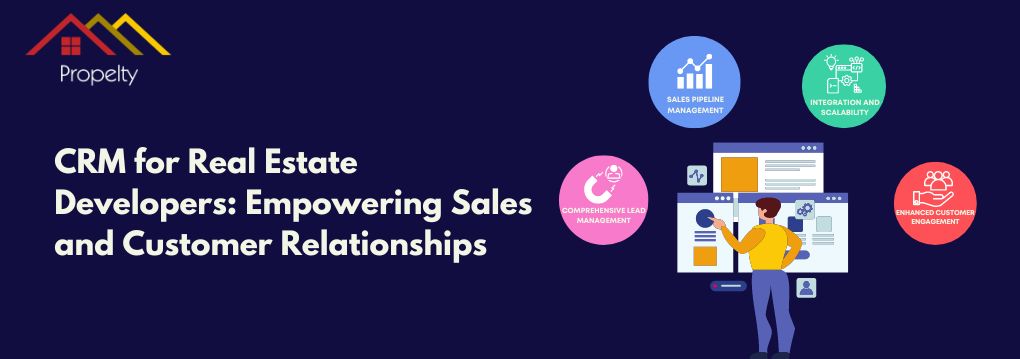In the highly competitive real estate industry, customer relationship management (CRM) systems have become indispensable tools for real estate developers. A CRM specifically tailored for real estate developers offers a range of features and functionalities that streamline sales processes, enhance customer relationships, and drive business growth. In this blog post, we will explore the must-have features in a CRM for real estate developers. These features are designed to optimize lead management, streamline sales workflows, improve customer engagement, and ultimately increase sales conversion rates

Comprehensive Lead Management
- Lead Capture and Tracking: A CRM for real estate developers should have robust lead capture capabilities. It should enable the seamless integration of lead sources, such as websites, landing pages, and social media platforms, and track leads from the moment of inquiry to conversion. This feature allows developers to efficiently manage and prioritize leads for follow-up and nurturing
- Lead Segmentation and Scoring: Effective lead segmentation helps real estate developers categorize leads based on various criteria, such as demographics, interests, and buying preferences. Lead scoring further enhances lead management by assigning scores based on lead quality and engagement level. These features enable developers to target the right leads with personalized marketing campaigns and sales efforts.
- Automated Lead Assignment: A CRM should have the ability to automatically assign leads to sales representatives based on predefined rules or round-robin distribution. This ensures prompt follow-up and eliminates the risk of leads falling through the cracks. Automation saves time, increases efficiency, and enhances the overall customer experience
Sales Pipeline Management
- Customizable Sales Stages: A CRM for real estate developers should allow the customization of sales stages to reflect the unique sales process of the organization. This enables clear visibility into the progression of leads and deals, facilitating accurate forecasting and strategic decision-making.
- Document and Contract Management: Effective CRM systems for real estate developers provide document and contract management capabilities. This feature allows sales teams to store, organize, and access critical documents, such as sales agreements, contracts, and legal disclosures, within the CRM platform. This streamlines the sales process, improves collaboration, and ensures compliance.
- Workflow Automation: Automation of repetitive and time-consuming tasks is crucial for real estate developers. A CRM should offer workflow automation features that streamline processes such as follow-ups, task assignments, and email notifications. By automating these processes, sales teams can focus more on building relationships and closing deals.
- Sales Forecasting and Analytics: Accurate sales forecasting is essential for real estate developers to make informed business decisions. A CRM with robust forecasting and analytics capabilities enables developers to analyze sales data, track key performance indicators, and generate insightful reports. This information empowers management with the ability to assess sales performance, identify trends, and refine sales strategies.
Enhanced Customer Engagement
- Personalized Communication: A CRM for real estate developers should facilitate personalized communication with prospects and customers. Features such as email templates, email automation, and personalized marketing campaigns enable developers to deliver targeted messages to specific segments, enhancing customer engagement and satisfaction.
- Customer Relationship Management: The CRM should offer a comprehensive view of each customer’s interactions and preferences. It should store detailed customer profiles, including communication history, property preferences, and feedback. This enables sales teams to provide personalized recommendations, anticipate customer needs, and deliver exceptional customer service.
- Automated Reminders and Notifications: Automated reminders and notifications ensure that sales representatives stay on top of important customer interactions, appointments, and follow-ups. This feature helps real estate developers maintain timely and consistent communication, resulting in increased customer satisfaction and loyalty.
- Customer Feedback and Surveys: A CRM should include tools for collecting customer feedback and conducting surveys. These features enable developers to gather valuable insights about customer preferences, satisfaction levels, and areas for improvement. By actively seeking customer feedback, developers can enhance their products, services, and overall customer experience.
Integration and Scalability
- Integration with External Systems: A CRM for real estate developers should seamlessly integrate with other systems used in the organization, such as accounting software, project management tools, and marketing automation platforms. Integration eliminates data silos, improves efficiency, and provides a holistic view of the business.
- Mobile Accessibility: In an increasingly mobile world, a CRM that offers mobile accessibility is crucial for real estate developers. Sales representatives can access the CRM on their smartphones or tablets, allowing them to manage leads, update information, and communicate with customers while on the go. This flexibility enhances productivity and responsiveness.
- Scalability and Customizability: A CRM should be scalable to accommodate the growth of the real estate developer’s business. It should also offer customization options to adapt to specific business processes and requirements. This ensures that the CRM can evolve alongside the organization and support its changing needs.
Conclusion
A CRM with must-have features for real estate developers is a powerful tool that can revolutionize sales processes and customer relationships. From comprehensive lead management and sales pipeline tracking to enhanced customer engagement and scalability, a well-implemented CRM can drive business growth, increase sales conversion rates, and improve overall operational efficiency. By investing in a CRM solution tailored to the real estate industry, developers can gain a competitive edge, strengthen customer relationships, and achieve long-term success in the dynamic and demanding real estate market.
Properly is a customized vertical CRM for the real estate industry that offers the features listed above. Contact our team to schedule a demo.
